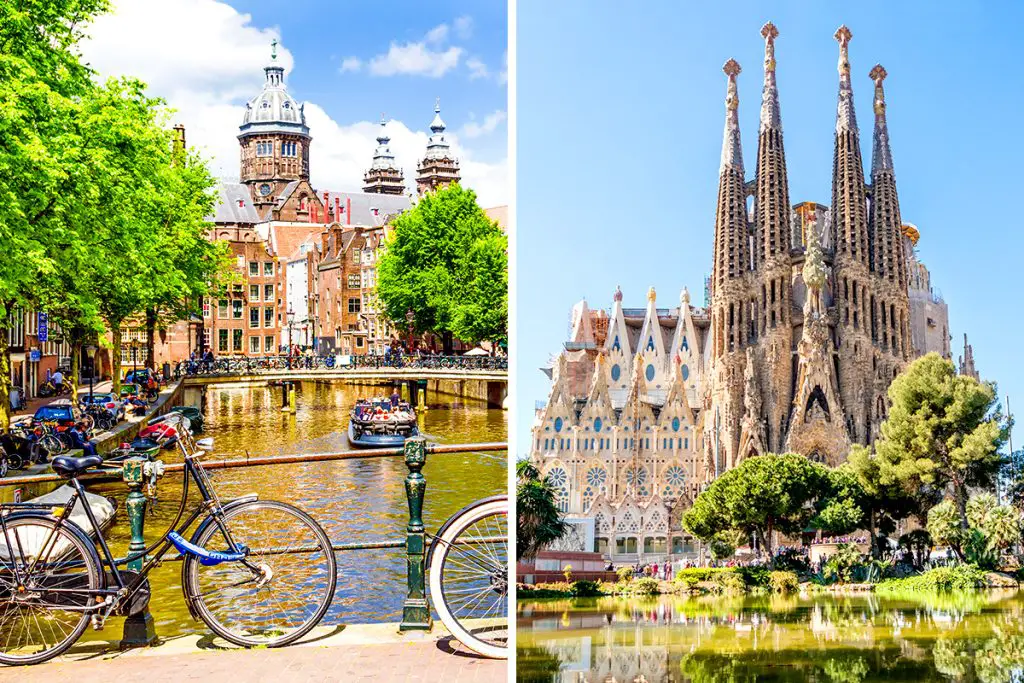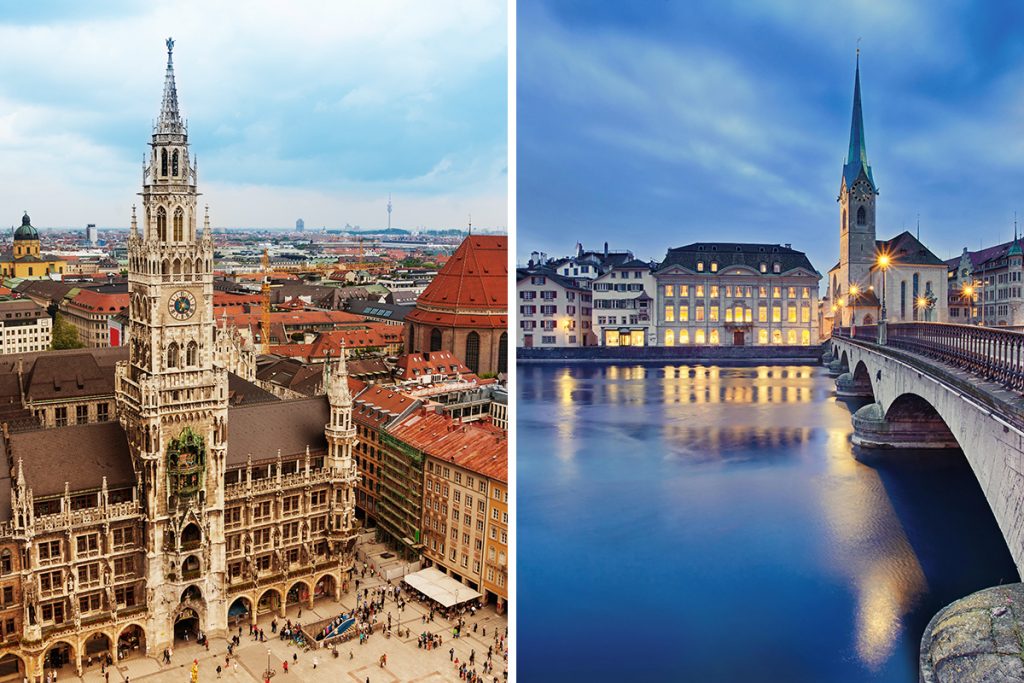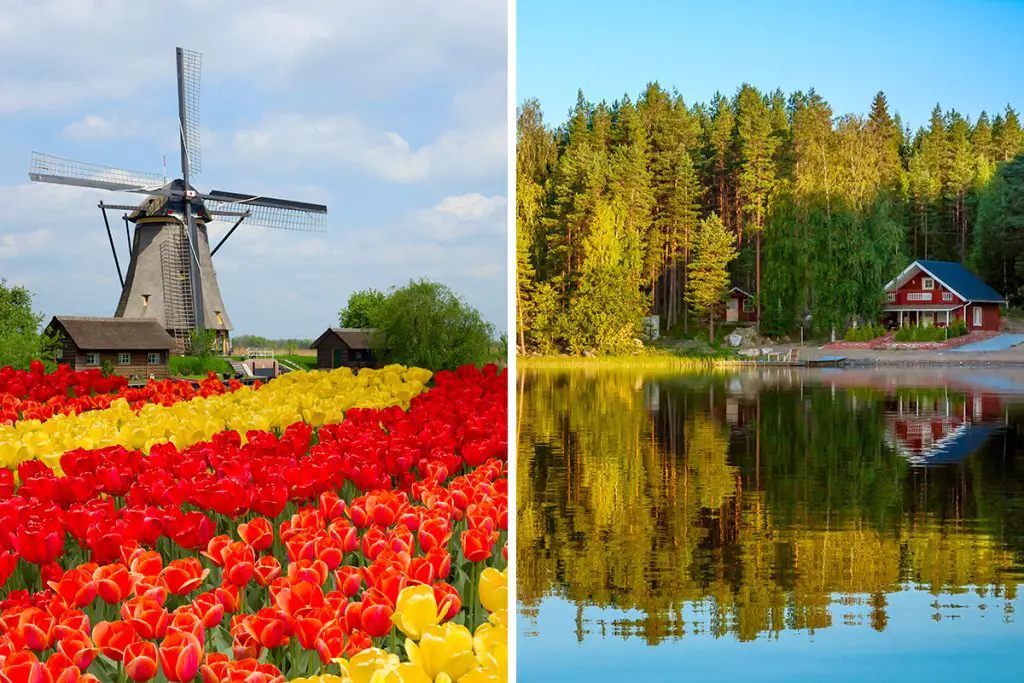Diving deeper, you’ll find that the Netherlands and Germany, though neighbors, have nurtured distinct identities over centuries. Your curiosity may pull you towards unraveling the stories etched in their ancient streets and iconic landmarks. As you ponder, let’s delve into the tapestry of time and traditions that these places offer to satiate your wanderlust. Read on to unearth what sets them apart and which one resonates with your quest for exploration.
History & Culture
The Netherlands and Germany both cradle a rich history, yet they present it in their unique styles. When you step into the quaint cities of the Netherlands, the essence of a bygone era greets you with a gentle whisper. The harmonious blend of medieval and modern architecture in towns like Utrecht and Haarlem reflects the Dutch spirit of innovation rooted in tradition.
On the flip side, Germany showcases its history with a blend of solemnity and grandeur. The towering castles and cathedrals narrate tales of ancient empires and timeless artistry. Each stone in places like Heidelberg or Cologne seems to hold a saga of the nation’s journey through the ages.
The Germans have meticulously preserved their legacy, making you feel like you’re stepping through pages of a living history book.
Now, let’s talk about the cultural vibrancy that adds color to the historical canvas of these nations. The Dutch are known for their open-mindedness and inclusivity, welcoming the new while cherishing the old. Their culture celebrates individual freedom, tolerance, and a love for nature which is evident in their daily lives and festivities.
On the other hand, Germany is often seen as a land of traditions with a strong sense of community. The Germans value order, precision, and a deep-rooted respect for their historical and cultural heritage. Their festivals, like Oktoberfest and Karneval, are a testament to their communal spirit and their penchant for celebrating history and traditions.
In conclusion, your journey through the Netherlands could be like a gentle stroll through a living museum, whereas Germany offers a more robust encounter with the past. The comparative simplicity of Dutch culture complements its serene landscapes, while the profound historical essence of Germany is mirrored in its majestic architecture and traditional celebrations. Your choice hinges on whether you crave a tranquil reflection or a grand narrative of history and culture.
Attractions & Activities
When embarking on a voyage of discovery, the attractions and activities awaiting you can make all the difference. Both the Netherlands and Germany offer a myriad of opportunities to delve into their unique characters. Let’s peel back the layers and see what adventures lie in wait for you in these captivating lands.
In the Netherlands, a bike ride is more than just a mode of transport—it’s an invitation to explore at a leisurely pace. The flat terrains and well-marked bike paths beckon you to uncover the picturesque countryside and historic towns.
In Amsterdam, a boat tour along the ancient canals introduces you to the city’s history from a different perspective, while a visit to the Keukenhof Gardens in spring immerses you in a sea of blooming tulips.
Germany, with its diverse landscapes, opens up a different realm of activities. The scenic routes like the Romantic Road take you on a journey through time, with stops at medieval towns and castles. The forests of Bavaria offer a tranquil escape with hiking trails that wind through lush woodlands and by serene lakes.
In cities like Berlin, a walk along the remnants of the Berlin Wall is a powerful reminder of Germany’s recent history.
While the Netherlands invites a more relaxed exploration with a focus on natural beauty and historic charm, Germany’s attractions are as vast and varied as its landscapes. Whether it’s the intellectual allure of the numerous museums and galleries in Dresden or the thrill of exploring the numerous castles dotting the German countryside, there’s a sense of grandeur that accompanies your every step.
Eating, Drinking & Nightlife
Embarking on a culinary adventure is a significant part of any voyage. The Netherlands and Germany offer a diverse palette of tastes, traditions, and nighttime festivities. Let’s saunter through the culinary lanes and vibrant evenings awaiting you in these two intriguing destinations.
Dutch cuisine might be modest but it’s comforting to the core. Indulging in a warm stroopwafel or a hearty portion of stamppot can be a delightful experience. German food, on the other hand, tends to be hearty and robust with dishes like sauerbraten and schnitzel, which are bound to satisfy even the most ravenous of appetites.
When it comes to quenching your thirst, the beer culture in Germany is legendary. The country is home to a plethora of breweries, each with its unique brew. Oktoberfest is a testament to Germany’s love for beer.
On the contrary, the Netherlands has a burgeoning craft beer scene, with Amsterdam and other cities housing innovative microbreweries, offering a fresh perspective to traditional brewing.
As the sun sets, the nightlife begins to shimmer. In the Netherlands, the evenings are often about gezelligheid, a word embodying coziness and conviviality. The night might start at a cozy brown cafe and end in a lively club playing electronic music.
Germany offers a broad spectrum of nightlife experiences. From techno temples in Berlin to sophisticated lounges in Munich, the night in Germany can be as wild or as refined as you wish.
In a nutshell, whether you are a food lover, a beer aficionado, or a night owl, both the Netherlands and Germany have something unique to offer. The simple pleasures of Dutch cuisine, the robust flavors of German dishes, the contrasting beer cultures, and the varied nightlife experiences enrich your European escapade, making it a memorable journey.
Shopping
The joy of discovering unique items and the thrill of a good bargain is universal. Both the Netherlands and Germany offer a plethora of shopping experiences, from high-end boutiques to quirky local markets.
In the Netherlands, markets like the Albert Cuyp Market in Amsterdam or the Grote Markt in Haarlem provide a delightful array of local goods, antiques, and fresh produce.
On the other hand, Germany is known for its quality craftsmanship, and cities like Munich and Frankfurt are dotted with boutiques offering exquisite items ranging from high-quality leather goods to intricately crafted ornaments.
Moreover, the Netherlands is known for its beautiful Delftware pottery, cheese, and tulip bulbs which are not only aesthetically pleasing but also carry the essence of Dutch culture. Germany, with its tradition of fine craftsmanship, offers a range of products like cuckoo clocks, beer steins, and handcrafted toys that reflect its rich cultural heritage.
When it comes to ease of shopping, both countries offer a mix of local markets, department stores, and luxury boutiques. However, Germany’s larger size and industrial background provide a broader range of shopping venues and a larger variety of products.
In summary, the shopping experience in either the Netherlands or Germany can be as unique and varied as the destinations themselves. Whether it’s the quaint charm of Dutch markets or the fine craftsmanship found in German boutiques, each shopping venture contributes to the tapestry of memories you’ll weave on your journey.
Accommodation
A snug abode after a day full of exploration is a small luxury every traveler cherishes. Both the Netherlands and Germany offer a variety of lodging options ranging from quaint to sophisticated, embodying the essence of their respective cultures.
In the Netherlands, the accommodation often reflects the country’s historical charm and modern efficiency. The boutique hotels in converted old buildings in the heart of Amsterdam or Utrecht offer a unique blend of the old and new. The Dutch love for water is also evident with numerous houseboat rentals available, offering a unique experience of living on serene canals.
Germany, on the other hand, displays a wider range of accommodation styles. The luxury hotels in Berlin or Munich often embody a blend of modern sophistication and traditional elegance. The countryside offers charming inns and B&Bs, often family-run, providing a cozy and personal experience.
Both countries have a strong tradition of hospitality, ensuring a pleasant stay regardless of the type of accommodation you choose. However, Germany’s larger size and diversity might offer a broader spectrum of lodging experiences.
In conclusion, whether you prefer the quaint charm of a Dutch houseboat or the traditional elegance of a German inn, the range of accommodations in both countries cater to various preferences, ensuring a restful retreat after your day’s adventures.
Family-Friendliness & Children’s Activities
Traveling with family, especially with kids, opens up a world full of playful discoveries and shared joys. Both the Netherlands and Germany present a variety of engaging experiences for the young and the young at heart.
The Netherlands is known for its relaxed attitude and love for outdoor activities. Families can enjoy cycling through the safe and well-maintained bike paths, exploring the countryside, and visiting interactive museums like the NEMO Science Museum in Amsterdam which makes learning fun for kids.
Germany offers a treasure trove of family-friendly activities. The numerous castles like Neuschwanstein Castle ignite the imagination of young knights and princesses. Moreover, theme parks like Europa-Park provide a whirlwind of excitement for children and adults alike.
Both countries boast excellent public amenities, making family outings convenient and enjoyable. While the relaxed pace of the Netherlands may appeal to families with younger children, Germany’s array of themed attractions might captivate the adventurous spirits of older kids.
Getting There & Getting Around
The journey begins with the first step, but a smooth travel experience hinges significantly on the ease of reaching your destination and moving around once you’re there. Let’s compare the accessibility of the Netherlands and Germany along with the convenience of exploring these beautiful lands.
Reaching either the Netherlands or Germany is relatively straightforward with major international airports like Amsterdam Schiphol and Frankfurt am Main facilitating your arrival from afar. They are well-connected with flights from numerous global cities.
Once on the ground, the compact size of the Netherlands makes getting around a breeze. The country boasts an efficient and punctual public transportation system, including buses and an extensive train network. Cycling is also a popular and convenient way to explore the cities and countryside.
Germany, being larger, has a well-established and efficient public transportation system as well, including a vast network of trains, trams, and buses. The Deutsche Bahn (German Rail) facilitates easy travel between cities, while local public transport systems are usually punctual and reliable.
Both countries support eco-friendly transportation options with bike-friendly cities and well-organized public transportation. However, the vastness of Germany may require more planning for inter-city travel compared to the compact and easily navigable Netherlands.
To sum up, whether you choose the quaint landscapes of the Netherlands or the expansive vistas of Germany, easy accessibility and convenient local transportation ensure a smooth travel experience, letting you focus on soaking in the beauty and culture these destinations offer.
Weather
When planning your travels, the weather can be a significant factor in deciding between destinations. Both the Netherlands and Germany experience a temperate maritime climate, yet there are subtle differences that could sway your decision. Let’s delve into the atmospheric offerings of these two European neighbors.
In the Netherlands, the winters (December to February) are mild, with temperatures averaging around 34°F to 40°F (1°C to 4.4°C). The summer (June to August) is pleasant and mild, with average temperatures ranging between 64°F to 72°F (17.8°C to 22.2°C). The country receives a fair amount of rainfall throughout the year, with October being the wettest month.
Germany has a slightly broader temperature range due to its larger size and geographical diversity. Winters can get chilly especially in January with temperatures ranging from 28°F to 45°F (-2.2°C to 7.2°C) while summers (June to August) are warm and pleasant with temperatures between 68°F to 77°F (20°C to 25°C).
Similar to the Netherlands, Germany has its share of rainy days, with the bulk of rainfall in June. Both countries have their charm in every season, whether it’s the spring tulips blooming in the Netherlands or the festive Christmas markets in Germany during winter.
In a nutshell, whether you prefer the steady, mild climate of the Netherlands or the slightly more varied weather conditions in Germany, both countries offer a range of experiences to match your meteorological preferences.
Safety
Safety is a paramount concern that can significantly influence your travel choice. Both the Netherlands and Germany are considered safe destinations with low crime rates and well-maintained public infrastructures.
When it comes to non-crime-related safety, both countries have comprehensive healthcare systems and are well-prepared for medical emergencies. Additionally, they both have excellent public alert systems in place for any natural or man-made emergencies.
While the crime rates are low, like in any place, it’s always advisable to stay vigilant, especially in crowded places or touristy areas to avoid petty thefts like pickpocketing.
Both countries have well-regulated traffic systems ensuring road safety. However, it’s essential to be aware of the bicycling rules in the Netherlands and the driving regulations in Germany to ensure a safe journey.
Summarizing, both the Netherlands and Germany provide a secure environment for travelers. Their well-maintained public systems and low crime rates ensure you can focus on enjoying the diverse experiences they offer.
Cost
Budgeting is a critical aspect of travel planning. Comparing the cost of living between the Netherlands and Germany can provide insights into how to budget your European adventure.
Food costs in both countries are relatively similar, though dining out in restaurants might be slightly more expensive in the Netherlands. For instance, a meal in a mid-range restaurant may cost around €30 in Germany and €35 in the Netherlands, which translates to around $31.50 in Germany and $36.50 in the Netherlands.
When it comes to accommodation, Germany offers a broader range of options that might cater to budget travelers more effectively. On average, lodging costs can be a bit lower in Germany than in the Netherlands.
Transportation costs can also be a factor. The public transportation system in both countries is efficient, but the ticket prices for trains and buses are often lower in Germany than in the Netherlands.
In conclusion, while both countries offer a wide range of experiences, Germany might be a slightly more budget-friendly option, especially for accommodation and transportation. However, the cost difference is not substantial, and both countries offer value for money for the unique experiences they provide.
Which Is Better – Netherlands or Germany?
Embarking on a journey to explore a new country is an adventure filled with anticipation and excitement. The choice between the Netherlands and Germany, each with its own unique charm and offerings, can indeed be a delightful dilemma. Here’s a recap and a guide on how to choose based on your preferences.
The historical and cultural richness of both countries provides a deep well of experiences. Netherlands offers a gentle stroll through its rich history with a tranquil reflection of its past, whereas Germany offers a robust encounter with a blend of solemnity and grandeur.
The quaint charm of Dutch cities contrasted against the grand narratives of Germany’s historic architecture each tell a unique story waiting to be discovered.
When it comes to attractions and activities, the Netherlands invites a more relaxed exploration with a focus on natural beauty and historic charm. On the other hand, Germany’s attractions are vast and varied with a sense of grandeur, be it the intellectual allure of museums or the thrill of exploring numerous castles.
The calm exploration in the Netherlands contrasts with the grand adventure awaiting in Germany.
The coastal experiences in both countries are distinct with the tranquil simplicity of Dutch beaches against the rugged charm of Germany’s Baltic shores. While the proximity of beaches to major cities in the Netherlands makes a spontaneous coastal visit easy, a trip to the German beaches might require a tad more planning.
The culinary journey, nightlife, and shopping experiences also present a contrast. The simple pleasures of Dutch cuisine and the relaxed evenings might appeal to those seeking a laid-back experience. In contrast, the robust flavors of German dishes, the lively nights, and the fine craftsmanship found in German boutiques offer a different flavor of excitement.
Accommodation, family-friendliness, and ease of transportation are fairly comparable in both destinations, offering a range of options to cater to various preferences. However, the more compact nature of the Netherlands makes it easier to navigate, whereas Germany’s larger size offers a broader spectrum of experiences, albeit with a bit more planning required for inter-city travel.
In summation, your choice hinges on your personal preferences. If a serene, laid-back, and easy-to-navigate experience resonates with you, the Netherlands would be your go-to destination. However, if a grand, robust, and diverse array of experiences excites you, then Germany awaits with open arms. Each country, with its unique offerings, promises a rich, unforgettable experience filled with cherished memories.







